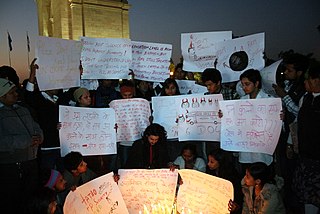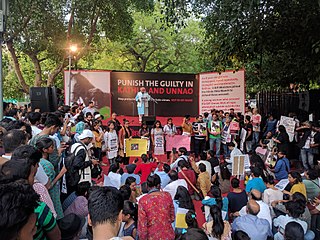Caste-related violence in India has occurred and continues to occur in various forms.
The 1992 Ajmer scandal was a series of gangrapes and blackmailing in which 250 female students in either schools/colleges aged between 11 and 20 years old were reportedly victims of this crime.

The National Commission for Women (NCW) is a statutory body of the Government of India, generally concerned with advising the government on all policy matters affecting women. It was established on 31 January 1992 under the provisions of the Indian Constitution, as defined in the 1990 National Commission for Women Act. The first head of the commission was Jayanti Patnaik. As of 19 October 2024, Vijaya Kishore Rahatkar is the chairperson.
Punishment for rape in Pakistan under the Pakistani laws is either death penalty or imprisonment of between ten and twenty-five years. For cases related to gang rape, the punishment is either death penalty or life imprisonment. DNA test and other scientific evidence are used in prosecuting rape cases in Pakistan.
Rape is the fourth most common crime against women in India. According to the 2021 annual report of the National Crime Records Bureau (NCRB), 31,677 rape cases were registered across the country, or an average of 86 cases daily, a rise from 2020 with 28,046 cases, while in 2019, 32,033 cases were registered. Of the total 31,677 rape cases, 28,147 of the rapes were committed by persons known to the victim. The share of victims who were minors or below 18 – the legal age of consent – stood at 10%.

The 2012 Delhi gang rape and murder, commonly known as the Nirbhaya case, involved a rape and fatal assault that occurred on 16 December 2012 in Munirka, a neighbourhood in South Delhi. The incident took place when Jyoti Singh, a 22-year-old physiotherapy intern, was beaten, gang-raped, and tortured in a private bus in which she was travelling with her male friend, Avnindra Pratap Pandey. There were six others in the bus, including the driver, all of whom raped the woman and beat her friend. She was rushed to Safdarjung Hospital in Delhi for treatment and, as the public outrage mounted, the government had her transferred to Mount Elizabeth Hospital, Singapore eleven days after the assault, where she succumbed to her injuries two days later. The incident generated widespread national and international coverage and was widely condemned, both in India and abroad. Subsequently, public protests against the state and central governments for failing to provide adequate security for women took place in New Delhi, where thousands of protesters clashed with security forces. Similar protests took place in major cities throughout the country. Since Indian law does not allow the press to publish a rape victim's name, the victim was widely known as Nirbhaya, meaning "fearless", and her struggle and death became a symbol of women's resistance to rape around the world.
Anene Booysen was a 17-year-old girl who was found by a security guard the morning after she had been gang-raped and disemboweled at a construction site in Bredasdorp, in the Western Cape, South Africa on February 2, 2013; she was still alive, but died later in the day.

Rajesh Gangwar is a socialist who believes in nonviolence. Born and raised in a small village of Bareilly, Uttar Pradesh he became an engineer, but left his career after becoming interested in social movements. He has been on several hunger strikes to protest against the harassment of women.
On 7 June 2013, a 20-year-old college student was abducted, gang-raped and murdered in Kamduni village, 16km from Barasat, North 24 Parganas district about 20km from main Kolkata. In January 2016 the accused were sentenced to death and life imprisonment.

The 2013 Mumbai gang rape, also known as the Shakti Mills gang rape, refers to the incident in which a 22-year-old photojournalist, who was interning with an English-language magazine in Mumbai, was gang-raped by five people including a juvenile. The incident occurred on 22 August 2013, when she had gone to the deserted Shakti Mills compound, near Mahalaxmi in South Mumbai, with a male colleague on an assignment. The accused had tied up the victim's colleague with belts and raped her. The accused took photos of the victim during the sexual assault, and threatened to release them to social networks if she reported the rape. Later, an eighteen-year-old call centre employee reported that she too had been gang-raped, on 31 July 2013 inside the mills complex.
On 27 May 2014, a gang rape and murder of two teenage girls was reported in the Katra village of Budaun district, Uttar Pradesh, India. It was widely reported in the press in India as well as overseas. After an extensive investigation, CBI concluded that there was no gang rape and the suspects were released. However, on 28 October 2015 the POCSO court rejected the CBI closure report; it was a major setback for CBI.

Kavita Krishnan is a women's rights activist who has publicised the problem of violence against women following the 2012 Delhi gang rape of Nirbhaya.
2014 Birbhum gang rape case involves a gang rape which took place on 21 January 2014 in Birbhum district of West Bengal. When a 20-year-old girl from Subolpur village was gang-raped by a group of people, as a punishment ordered by Salishi Sabha, a village kangaroo court, for having affair with a boy of a different community.
India's Daughter is a documentary film directed by Leslee Udwin and is part of the BBC's ongoing Storyville series. The film is based on the 2012 Delhi gang rape and murder of 22-year-old Jyoti Singh, aliased "Nirbhaya", who was a physiotherapy student. The documentary explores the events of the night of 16 December 2012, the protests which were sparked both nationally and internationally as a result of the assault, and the lives of the men before they committed the attack. The film is told through the use of reconstructed footage and interviews with those involved in the case, including the defence lawyers, psychiatrists, and one of the rapists.

The Maratha Kranti Morcha, loosely translated as "Maratha revolutionary demonstration" in the Marathi language, was a series of silent and pragmatic protests organized by the Maratha community in various cities across India, and in overseas diaspora communities. Other groups, such as Muslims and other religious minorities, also supported the Morcha. The impetus for the rallies was the rape and murder of a 15-year-old girl in Kopardi village, Maharashtra, on 13 July 2016. The protesters demanded the death sentence for the rapists. The Maratha caste dominate the power and cultural structure in Maharashtra due to the size of their population.

The Kathua rape case involved the abduction, gang rape, and murder of an 8-year-old girl, Asifa Bano, by seven males in January 2018 in the Rasana village near Kathua in Jammu and Kashmir, India. A chargesheet for the case was filed, the accused were arrested and the trial began in Kathua on 16 April 2018. The victim belonged to the nomadic Bakarwal community, and the crime was a bid to terrorise the group off Jammu. She disappeared for a week before her body was discovered by the villagers a kilometer away from the village. The incident made national news when charges were filed against eight men in April 2018. The arrests of the accused led to protests by the Panthers Party and other local groups, who sought justice for the victim. The gang rape and murder, as well as the support the accused received especially from local officials of the [ Political Party ] , sparked widespread outrage in India and world-wide.
On 14 September 2020, a 19-year-old woman was allegedly gang-raped in Hathras district, Uttar Pradesh, India, by four men. She died two weeks later in a Delhi hospital.
On 29 September 2020, a 22-year-old Dalit college girl was gang-raped and assaulted in Balrampur, Uttar Pradesh, India and she died on way to the hospital. Her family says that she was abducted on her way back home and raped by at least two Muslim men, Shahid and Sahil. Postmortem report suggests she was badly tortured even after the rape. The postmortem report said there were at least ten antemortem injuries on her body: eight contusion wounds on her cheek, chest, elbows and left thigh; and two abrasions on her left leg and knee. The two men accused were arrested by UP police, and the Uttar Pradesh government has offered financial assistance to the victim's family.
In May 2022, the gang rape of a 17-year-old girl in Road no. 44, Jubilee Hills, Hyderabad, sparked outrage across Telangana and India. The minor girl returning home after attending a get-together at Amnesia pub was gang-raped by six persons, including five minors in Jubilee Hills area of the State capital. All the accused were arrested by police from their separate hideouts.
On 1 November 2023, a 22-year-old B.Tech student of IIT-BHU was allegedly waylaid, stripped and gang-raped. They also filmed the girl at gunpoint, in Banaras district, Uttar Pradesh, India, by three Members of the BJP IT Cell.






